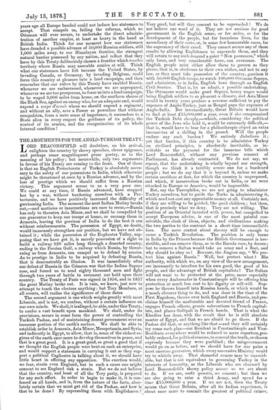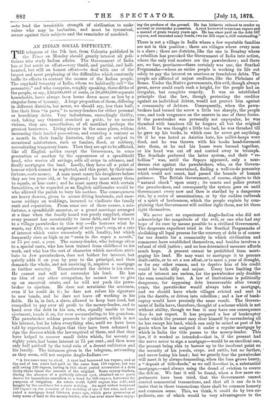THE ARGUMENTS FOR THE ANGLO-TURKISH TREATY.
LORD BEACONSFIFLD will doubtless, on his arrival, enlighten the country by showy speeches, clever epigrams, and perhaps some magniloquent prose poetry, as to the meaning of his policy ; but meanwhile, only two arguments
in favour of his Treaty are coming to the front. One of these is that an English Protectorate of Turkey is absolutely neces- sary to the safety of our possessions in India, which otherwise might be threatened at once by a Russian advance, and by the loss of prestige which we should suffer from a Russian victory. This argument seems to us a very poor one. We could at any time, if Russia advanced, have stopped her by a war, without burdening ourselves with a Pro- tectorate, and we have positively increased the difficulty of garrisoning India. The moment the next Indian Mutiny breaks out,—and mutinies or insurrections are sure to recur,—Russia has only to threaten Asia Minor, and we shall be compelled by our guarantee to keep our troops at home, or encamp them in Armenia, leaving the garrison of India to do the best it can without reinforcements. The possession of Egypt, no doubt, would immensely strengthen our position, but we have not ob- tained it ; while the possession of the Euphrates Valley, sup- posing that we have got it, is merely possession of a right to build a railway 920 miles long through a deserted country, ending in the Persian Gulf, a railway which Russia, by threat- ening us from Armenia, can compel us to defend by armies. As to prestige in India to be acquired by defeating Russia, that is demonstrably an illusion. It was immediately after our defeat of Russia in the Crimean war that the Indian Sepoys rose, and forced us to send eighty thousand men and fight through two years of battle to recement our hold upon their country. The Treaty of Paris was signed in 1856, and in 1857 the great Mutiny broke out. It is vain, we know, just now to attempt to teach the electors anything ; but Tory Members, at all events, will realise the significance of those dates.
The second argument is one which weighs greatly with most Liberals, and is not, we confess, without a certain influence on our own minds. We shall, it is alleged, be able, under this Treaty, to confer a vast benefit upon mankind. We shall, under its provisions, secure in some form the power of controlling the Turkish Pashas, and of maintaining decent government over an immense portion of the earth's surface. We shall be able to establish order in Armenia, Asia Minor, Mesopotamia,and Syria, and indirectly in Egypt, to allow, that is, some of the richest re- gions of the earth once more to develop themselves in peace, and that is a great good. It is a great good, so great a good that if we thought the English people were bent on such an enterprise, and would support a statesman in carrying it out as they sup- port a political Cagliostro in talking about it, we should have little heart in offering any opposition. The exertion would, we fear, strain even England, but in such a cause one might consent to see England risk a strain. But we do not believe that the country, and least of all the Tory party, is prepared for any such effort. In order to begin to make it, it is con- fessed on all hands, and is, from the nature of the facts, abso- lutely certain that we must get rid of the Pashas, and how is that to be done By superseding them with Englishmen ?
Very good, but will they consent to be superseded ? We do not believe one word of it. They are not anxious for good government in the English sense, or for order, or for the development of the people, but for luxurious lives, for the ascendancy of their caste, or, in some few honourable cases, for the supremacy of their creed. They cannot secure any of these results by allowing Englishmen to supersede them, and they will return to any such demand a quiet " Non possumus," which only force, and very considerable force, can overcome. The English people must either allow them to govern as they please, that is, in obedience to their own wishes, and not to any law, or they must take possession of the country, garrison it with 50,000 English troops, to watch 100,000 Ottoman Sepoys, and administer, as in India, English laws through an English Civil Service. That is, let us admit, a possible undertaking. The Ottomans would make good Sepoys, heavy wages would bring English soldiers to so pleasant a climate, and Asia Minor would in twenty years produce a revenue sufficient to pay the expenses of Anglo-Turkey, just as Bengal pays the expenses of Anglo-India. But intermediately, Great Britain would have to find at least £15,000,000 a year, even if she compromised the Turkish Debt cheaply,—which, considering the political power of the Jews who hold it, would be extremely difficult,— that is, would have to bear for a philanthropic object an extra income-tax of a shilling in the pound. Will the people endure any such burden ? We entirely disbelieve it ; yet that burden, if this country is to administer Turkey on civilised principles, is absolutely inevitable, as in- evitable as the payment for the immense bills which Lord Beaconsfield, without any previous consent of Parliament, has already contracted. We do not say, we repeat, that the undertaking is wholly beyond our strength, though we think it a terribly severe one for a burdened people ; but we do say that it is beyond it, unless we make certain sacrifices at first, for which the country is unprepared, and which, if insurrection broke out in India, or we were attacked in Europe or America, would be impossible.
But, say the Turcophiles, we are not going to administer Turkey ourselves, but to guide the Turks in administering it, which need not cost any appreciable money at all. Certainly not, if they are willing to be guided, like good children ; but then, that is precisely what we deny. They are not willing. The position of an Oriental invested with power, but compelled to accept European advice, is one of the most painful con- ceivable, the clash of ideas, objects, and civilisations making the two parties to the contract in a short time irreconcilable foes. The mere contest about slavery will be enough to cause a Turkish Revolution. The position is only borne in India by the Princes because the British Government is irre- sistible, and can remove them, as in the Baroda case, by decree ; but to remove a Sultan would take an army and a fleet, and why should he obey us? Because, the Jingoes say, " We pro- tect him against Russia." Well, but protect what ? His authority, with which we, on any view of the new arrangement, are incessantly to interfere for his own good, the good of his people, and the advantage of British capitalists ? The Sultan will not want to be protected at the price, more especially when every Ambassador in Constantinople will be offering him protection at much less cost to his dignity or self-will. Sup- pose he throws himself into Russian hands, or which would be a much cleverer thing to do, and was done in the time of the First Napoleon, throws over both England and Russia, and pro- claims himself the unalterable and devoted friend of France, engages French officers, grants subventions to French capital- ists, and places Gallipoli in French hands. That is what the Khedive has done, with the result that he is still absolute master of Egypt, and that we are afraid to go there. If the Pashas did that, or anything like that —and they will certainly try some such plan—our Resident in Constantinople and Vice- Residents everywhere would be reduced to mere reporters, pro- bably ordered, for political reasons, to conceal the truth, or chosen expressly because they were purblind ; the misgovernment would go on as before, and we should have for our pains a most onerous guarantee, which every successive Ministry would try to whittle away. That shameful course may be unavoid- able, but that is not equivalent to governing Turkey in the interests of humanity, as the Liberals who are charmed by Lord Beaconsfield's showy policy assure us we are about to do. If we are, caclit qucestio, we consent ; but then we are also going to raise a third Army, and spend for a
time £15,000,000 a year. If we are not, then the Treaty means that Great Britain, after all its Indian experience, is about once more to commit the greatest of political crimes, —to lend the irresistible strength of civilisation to make rulers who may be barbarian, and must be tyrannical, secure against their subjects and the remainder of mankind.



































 Previous page
Previous page